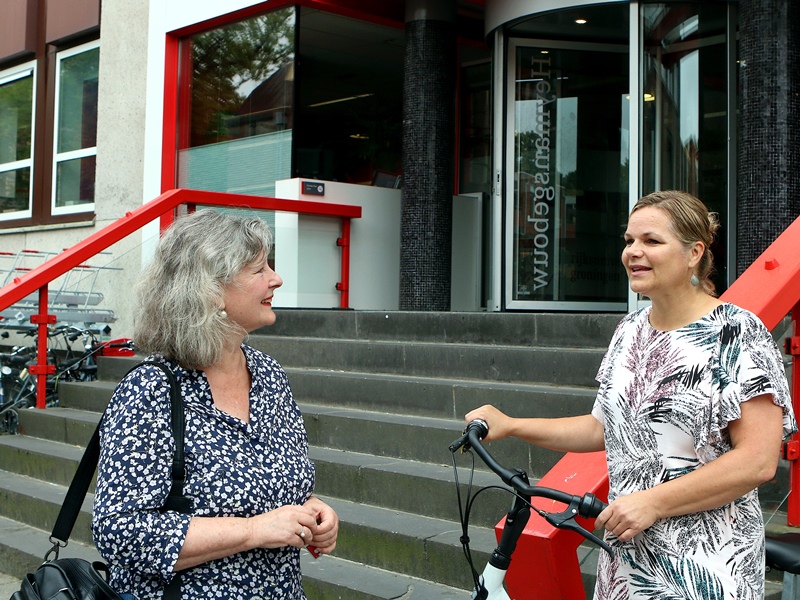
Duo-interview:
Perspectives on clinical psychology research
Recently, the University of Groningen awarded professorships to two senior researchers working in different regional MHC institutions, Marike Lancel and Stynke Castelein. Prof. Castelein’s inaugural lecture took place on 14 November 2017. In her lecture, she discussed the importance of studying recovery from severe mental illness (SMI). Prof. Lancel’s inaugural lecture, which took place on 27 March 2018, highlighted her focus on the role of sleep in psychopathology.
Profs. Lancel and Castelein are now both affiliated with the Department of Psychology’s Clinical Psychology and Experimental Psychopathology unit. Meanwhile, Prof. Lancel continues her function as head of research in the Forensic Psychiatric Hospital of GGZ Drenthe, and her clinical practice in the Psychiatric Sleep Center Assen, and Prof. Castelein remains at the Research Department of the Lentis Psychiatric Institute to study how to improve recovery.
Given their new position, with one leg firmly in clinical practice and the other one more firmly than ever in scientific research, Mindwise decided to ask them some questions. So continue reading if you would like to learn more about these two professors’ past, present, and future!
Mindwise: Your research interests focus on sleep and mental illness (Prof. Lancel) and on recovery from mental illness (Prof. Castelein). What are your ideas on the role of sleep in recovery from mental illness?
Prof. Lancel: Sleep is very important for mental integrity. Most of us have the experience that poor sleep negatively affects functions such as attention and memory, logical reasoning, and decision-making. Disturbed sleep also contributes to mental problems, such as depression, anxiety, and addiction. It increases the risk for the development of, and relapse in, major psychiatric disorders. Further, disturbed sleep may inhibit recovery from mental illness. For instance, in people with depression and insomnia, a therapy directed at insomnia has effects on the depression that are comparable to those of antidepressant medication interventions. Thus, in sharp contrast to the general practice in MHC, early detection and treatment of sleep disorders promises to augment recovery.
Prof. Castelein: Sleeping well is important for all humans, because it influences your daily functioning. People with SMI often have a distorted day/night rhythm, which can have serious consequences for their recovery. Unfortunately, sleeping well does not prevent mental illness. However, having a good sleep/wake rhythm during the recovery phase, when symptoms are less florid, is very important. Studies to date have small sample sizes and most are not recent. Therefore studying sleeping patterns and its influence on a persons’ clinical, personal, and societal recovery is very interesting in my opinion.
Mindwise: In addition to your professor appointment at the university, you both continue to work in a large mental health care institution in the region. How do you find working as researchers in mental health care? How do your different roles inform each other?
Prof. Lancel: At GGZ Drenthe, I work at the Psychiatric Sleep Centre Assen, both as somnologist and as senior investigator. This is an interesting combination as clinical practice and research fertilize each other: clinical practice guides research, and research findings can readily be clinically implemented. I experience my professor appointment as a useful and welcome enrichment of my work, thanks to the more research-focused environment and collaborations with fellow researchers with their own fields of expertise. I am gaining in-depth knowledge on topics that never crossed my mind before, such as the role of sleep in bereavement and complicated grief. Moreover, I can teach future psychologists about the clinical relevance of sleep disorders and psychotherapeutic sleep interventions.
Prof. Castelein: Working in a large MHC institute means being aware of clients’ care needs and what the relevant clinical questions are of the psychiatric institute’s MHC professionals and policy makers. Therefore, our research questions are closely connected to the current clinical situation. Scientific studies are always designed in collaboration with clients, MHC professionals, and other experts on the topic. One great aspect is that positive results from our studies can be quickly implemented in clinical practice. With regard to the different roles informing each other: with colleagues from both the University of Groningen and multiple psychiatric institutes, I am currently analyzing a large dataset from the psychiatric institutes with data on the course of recovery. A good example of effective research collaboration between the field and the university leading to a recovery model!
Prof. Castelein asks Prof. Lancel: What is your ultimate dream in terms of what you would like to accomplish with your sleep research?
Prof. Lancel: Till now research mainly focused on the link between depression and insomnia. I think it is crucial to get more insight into the relationships between other common mental diseases and sleep disorders. For instance, what is the influence of sleep apnea on the development and recovery of Post-Traumatic Stress Disorder? Does treating a Delayed Sleep Phase Syndrome reduce the severity of ADHD symptoms? May depression medications, known to stimulate Restless-Legs Syndrome, aggravate mood disorders? In view of the importance of good sleep for mental health, and to speed up and stabilize recovery from mental conditions, GGZ Drenthe and the University of Groningen are currently collaborating on a program for early detection and treatment of sleep disorders in MHC. This is a unique and highly relevant project. It would be fantastic if the program exerts positive effects and can be implemented as regular care. Further, I like to accomplish the customization of various standard sleep therapies to specific psychiatric populations to increase the effectiveness of the interventions. For instance, we are currently adapting the protocol of cognitive-behavioral therapy for insomnia to people with complex mental disorders who are admitted for inpatient treatment. Last but not least, I dream of unraveling the mechanisms underlying the reciprocal relation between sleep and mental health, which may result in new, sleep-based treatments for mental diseases.
Prof. Lancel asks Prof. Castelein: Your research in SMI patients shows that societal recovery is lagging far behind clinical recovery. I can imagine that this insight provides opportunities for improving patients’ lives. Is this true, and what opportunities are there?
Prof. Castelein: Indeed we found that societal recovery (e.g. daily living, work, study, and social contacts) lags behind personal and clinical recovery. However, the course, the number of trajectories, and the most important predictors are still quite unknown for all three types of recovery. For this reason, we now examine the data in more detail to get insight into homogeneous trajectories of community functioning over time in people with a psychotic disorder. We also examine clinical, societal, and personal recovery data in a mixture latent Markov model with transition probabilities over time. Another study investigates which factors most affect someone’s recovery. Outcomes of these studies are important for clinical practice: Where can we intervene? Which people can recover even more? At the same time, we carry out several clinical trials. For example, one trial investigates the effect of an eating club that provides peer support and home-based skill training. In another study, we examine the effect of mixed living in sheltered housing (i.e., people with and without SMI will live together on the same location) with the aim to improve social integration.
Mindwise: It seems your clinical research will still keep you happily busy for years. But what about the next generation? Current Psychology students interested in working in clinical practice may also consider combining this with a research career. What is your advice for them?
Prof. Castelein: My first suggestion is to combine working as a psychologist with a research-assistant job. This will give you the space to explore the world of clinical research! Another suggestion is to ask psychologists who have completed their PhD project in MHC about their experiences, and those who did not complete it.
Prof. Lancel: Many psychology students seem to have the idea that you are either suited for clinical work or for scientific research. Yet in practice therapists often experience doing research (as part of the post-Master clinical psychology training, for example) to be very satisfying and bring more variety into their work. Moreover, research is crucial for treatment innovation, particularly in MHC institutes. Therefore, GGZ Drenthe stimulates this combination.
Note: Image by Sander van Lien, with Prof. Lancel on the left and Prof. Castelein on the right.



